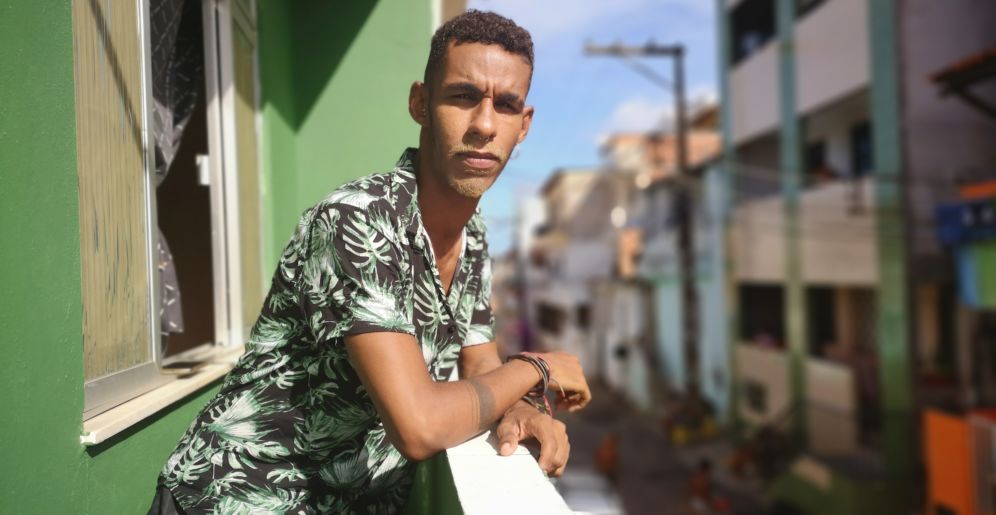
Brazil
black english: from salvador’s favela to the world
Often also called complexos, favelas make up large parts of urban landscapes across Brazil, an unhidden display of Brazil’s wealth gap between rich and poor. These communities are largely resided by Afro-descendent people and remain a stark reminder of oppression and inequality which still lingers from Brazil’s colonial past.
Adriano Carvalho, 25, is an English teacher born and raised in Nordeste de Amaralina, a large complexo in Salvador da Bahia formed of four neighbourhoods; Santa Cruz, Valle das Pedrinhas, Nordeste and Chapadas. After moving to Rio with his mother for a short while where his sisters were born, once back in his former neighbourhood, Adriano’s passion for learning English began, which he credits his first English teacher for, as he hadn’t always been taken by the English language. At 15, Adriano was awarded a full scholarship to learn English through an access program for underprivileged young people.
“I remember the first semester at the private English school, some of the students were speaking really fluent english, and I was asking myself ‘what am I doing here? This is not my space’ and then I was like, ‘no, I need to challenge myself!’ Everything I’ve achieved I got by myself, but I had someone to encourage me, that was my English teacher. I want to provide the same for the Black people of my community.”
When I first met Adriano during carnival in Salvador earlier this year, one of the things which struck me was that was his fluency in English, which I’ll admit came as a surprise as I hadn’t met many Black people in Brazil who speak fluent English. Anywhere else in the world, the fact that someone speaks English linked with their race wouldn’t have been a factor of surprise, however in Brazil having a second language such as English is largely connected to class. “If you go to a rich neighbourhood, most of the people who live there have been abroad before, they know how to communicate in English due to one reason — they have money for it. The project Black English will focus on that to help my community communicate with the rest of the world.” Adriano shared.
Today Adriano is a qualified English teacher in a school of predominately white children, yet despite ‘making it,’ he’s is inspired to pass on the opportunities he was fortunate to have, by offering English classes in his community to help bridge the inequality gap most his community still face. Black English is a project which will allow the English-speaking Black diaspora to volunteer in his community to teach English, offer workshops and also have tours given by locals who’ll be able to practice their English. He believes having a second language will help create opportunities for people of his neighbourhood, as well as provide access to international platforms.
“My idea to help poor Black people from my community to communicate in a second language, which is English. As a Black English teacher, and as I live in this neighbourhood, it’s important that I start here.”
Intrigued to know more about Black English and the community he’s so passionate about uplifting, Adriano extended an invite for me to his home in Chapadas, and I took him up on that offer. It hadn’t occurred to me the negative stigma of crime his community has largely due to the media, and I remember having to insist to my Uber driver on more than one occasion that “yes, I’m sure this is where I want to go.” Once there, I got insight into Adriano’s life as the sole bread-winner of his household to help out his single mother and two other sisters he lives with. I was greeted with warm hospitality, as would be expected in any Black home. I found it amusing when Adriano later explained that he had to tell his mother ‘a foreigner is coming to the house – but she’s Black’, which automatically gave me an ‘ok’ pass.
“We don’t see much representation of Black people who speak English, or Black volunteers coming to our community. When we think of volunteers we only think white people. So the project will be a great way to connect the diverse representation of the Black English-speaking world and welcome them to our community – show them the real Nordeste.”
In recent years Nordeste de Amaralina has gained notoriety for its community carnival, as well as a portal NES – “Nordesteusou” dedicated to sharing news from the local area the media doesn’t often get highlight. “Nowadays our carnival has become very famous because of the website. The Government is trying to come to our community just to help us with some public bathrooms – but f**k them! We’re not interested in bathrooms. We’re interested in having a good community, a safe community. Not a public spectacle during carnival. That is not our intention.”
Find out more about Black English and how you can become a volunteer here.
Get The Latest
Signup for the AFROPUNK newsletter



